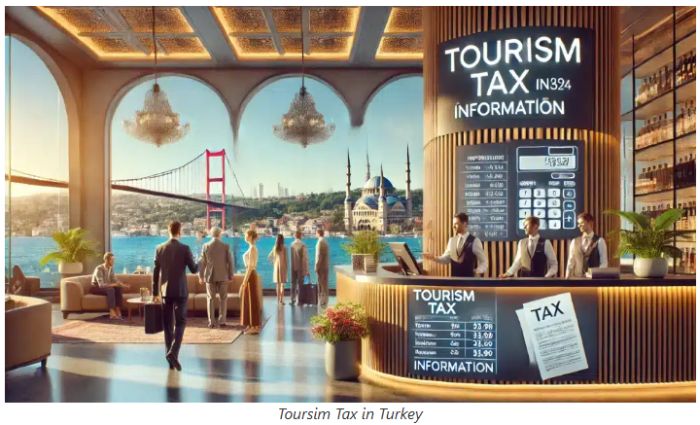Tourism Tax in Turkey: Key Details for Business in 2025
As one of the world's top tourist destinations, Turkey attracts millions of visitors annually with its rich history, stunning landscapes, and vibrant culture. However, with tourism growth comes additional costs for maintaining infrastructure and services. To address these needs, Turkey has introduced a tourism tax, a policy that impacts both tourists and the tourism industry. This article explains what the tourism tax in Turkey entails, its rates, and its implications for visitors and businesses, making it essential reading for anyone planning a trip or willing to invest in Turkey
What is the Tourism Tax in Turkey?
Tourism tax, officially known as Accommodation Tax & Tourism Contribution Share in Turkey, is a tax applied to accommodations in various types of accommodation such as hotels, motels, holiday villages and holiday villages, and the income obtained from these accommodations, as well as travel agencies and airline companies that mediate access to these accommodations. Introduced as part of the government's efforts to generate additional revenue, the tax aims to support tourism-related projects and develop the country's infrastructure.

Key Features of the Tourism Tax in Turkey
Tourism tax is calculated as a percentage of the total accommodation cost for tourists, excluding Value Added Tax (VAT), while for tourism businesses it is calculated as a certain percentage of their income. This means that when you book an accommodation in Turkey, or make a tourism investment, the tourism tax is an additional cost to your reservation price or investment amount.
1. Applicable Venues:
- Hotels
- Hostels
- Resorts
- Guesthouses
- Holiday rental properties
- Travel agencies
- Airline businesses
2. Tax Rate:
- For tourist: Tourism tax is a standard rate of 2% of the accommodation fee and may vary based on government revisions or specific exemptions.
- For Toursim Businesses: Tourism tax is applied to tourism businesses at varying rates depending on the business's concept, bed capacity and services offered, as follows:
|
TYPE OF BUSINESS |
RATES of TOURISM CONTRIBUTION SHARE |
|---|---|
| Integrated facilities and accommodation facilities | 5‰ |
| Food and beverage facilities certified by the Ministry of Culture and Tourism | 5‰ |
| Marine tourism facilities | 5‰ |
| Marine tourism vehicles certified by the Ministry of Culture and Tourism | 5‰ |
| Travel agencies | 0.05‰ |
| Airline companies | 0.05‰ |
| Airport and terminal operators (excluding those operated by State Airports Authority) | 2,‰ |
3. Redustions:
- For tourism facilities that are deemed appropriate for promotion by the Ministry of Culture and Tourism, such as winter, thermal, health, rural and qualified sports tourism, the rates shown in the table above are applied with a 50% REDUCTION.
4. Exemptions:
- Educational institutions offering student accommodation.
- Diplomatic missions, consulates and their members with diplomatic rights in Turkey
- Facilities used by military personnel.
Tourism Tax declaration is given monthly. The declaration for the relevant month must be given by the end of the following month. Payment must be made by the end of the following month.
Impact on Tourists of Toursim Tax in TurkeyFor most visitors, the tourism tax is a minor additional expense. For example:
- A hotel room costing $100 per night will incur a $2 accommodation tax per night.
- Over a weeklong stay, this amounts to an extra $14, which is relatively modest.
Tips for Tourists:
- Check Before Booking: Ensure your accommodation provider includes or clarifies the tax in their pricing.
- Budget Accordingly: Include the tax in your travel budget to avoid surprises.
Impact on the Industry of Toursim Tax in Turkey
The tourism tax has sparked debate within Turkey's tourism sector. While it provides a much-needed source of revenue for public services and infrastructure, some industry stakeholders worry it may deter budget-conscious travelers.
Pros for the Industry:
- Enhanced Infrastructure: Funds from the tax can be reinvested in roads, airports, and public amenities, ultimately benefiting the tourism sector.
- Sustainable Growth: By funding environmental preservation and cultural heritage projects, the tax promotes sustainable tourism.
Cons for the Industry:
- Competitive Pricing: The additional cost may make Turkey less competitive compared to other destinations without such taxes.
- Rising Tax Costs: The added burden of increased taxes could discourage potential investors and weaken their commitment to investing in Turkey.
- Administrative Burden: Hotels and other accommodations must implement systems to manage and report the tax.
Comparison with Other Countries & Future Outlook on Tourism Tax in Turkey
Turkey is not alone in implementing a tourism tax. Many other popular destinations, such as France, Italy, and Thailand, have similar levies. However, Turkey's tax rate is relatively low compared to the average 4-5% charged in European countries.
As Turkey continues to attract record numbers of tourists, the revenue generated from the tourism tax is expected to play a vital role in developing the country's tourism infrastructure. However, the government must ensure transparency in how the funds are used to maintain trust and support from both the tourism industry and visitors.
The content of this article is intended to provide a general guide to the subject matter. Specialist advice should be sought about your specific circumstances.


